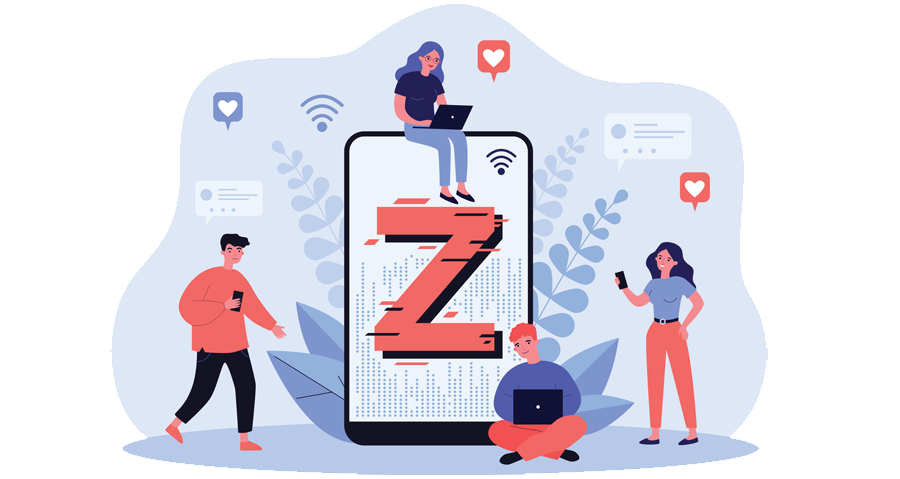
By Lauren Comander
As the latest generation to enter the workforce, Gen Z brings its own set of expectations, and executives take heart.
It was summer of 2015, and Visa employees in Miami, where the tech payments company has its headquarters for Latin America, noticed changes in the workplace. Parking spaces once reserved for executives were now open to all. Leaders renounced their executive-only lunch table in favor of sitting with their employees, breaking bread as they inquired about everyone’s days. It was the beginning of a culture change journey that continues today.
Now, managers send employees flowers on their birthday and soup to those home sick. Office walls that once literally and figuratively divided employees have been knocked down, creating an open workspace that caused some disgruntled executives to head for the door but delighted the younger generation which craves a workplace culture of equality.
The genesis of these gestures? A concerted effort by company executives to lead with empathy. After all, this is an important quality to the newest generation of workers, Generation Z (or, as they’re affectionately called, Zoomers). Taking note of this cohort only makes good business sense: While the Zoomers, defined by Pew Research Center as those born between 1997 and 2012, are just now entering the workforce, they will more than triple to account for 30% of employees by 2030, according to a study by Oxford Economics.
"The perfect leader to them is someone who is caring and Balanced, relatable and authentic. This generation can sniff Out someone who is fake, a skill they learned on social media."
-Maribel Diz (DBA ’21, MSHRM ’07)
So what exactly does this new cohort of workers want?
“This generation wants inspirational leadership,” said Maribel Diz (DBA ’21, MSHRM ’07), Visa’s senior vice president, People Team, Latin America and Caribbean Region, whose FIU Business dissertation explored how leaders can keep the Zoomers happy. “The perfect leader to them is someone who is caring and balanced, relatable and authentic. This generation can sniff out someone who is fake, a skill they learned on social media.”
The upshot for company leaders?
“Bosses can’t use a cookie-cutter approach,” Diz said. “How do you as a leader figure out what motivates one person versus another? One size does not fit all, and it’s hard. There needs to be a connection greater than an institution for an employee to want to stay with you, and want to work with you so how do you set that connection? You lead with empathy or from the heart.”
As the first generation born into a digital world, these so-called digital natives have been communicating online their entire lives – and they tend to prefer it that way.
“Gen Z is just as comfortable collaborating using technology as they are in person,” said Ravi Gajendran, FIU Business professor of global leadership and management, who conducts research on flexible work arrangements. “They might even prefer to text, even if they are in the same physical location as their co-workers. This has always been a natural form of communication for them.”
Also born from a lifetime of online use is their decidedly informal style of communication, complete with emojis and missing punctuation that often confuses older workers. By the same token, the Zoomers are often left wondering what to make of an older colleague’s ellipses or long blocks of text.
"Gen z is just as Comfortable Collaborating using Technology as they are In person. This has always Been a natural form of Communication for them."
- Ravi Gajendran
While they are comfortable on social media, they have heeded the lessons of those who came before them. After observing the pitfalls of communicating online that befell the millennials, Gen Z is very private and doesn’t overshare, Diz noted.
These tech-savvy workers want to acquire new skills on their own terms. Gone are the days of long retreats and PowerPoint presentations, replaced by YouTube tutorials and interactive microtrainings they can complete at their own pace. They are selfdirected and have an uncanny ability to deeply focus, but they are distracted by noise. This explains the group’s penchant for the noisecancelling headphones that have given rise to the misperception that they are antisocial and noncollaborative, Diz said.
While they aren’t antisocial, they did come of age during a global pandemic and spent an extended period of their formative years isolated and learning remotely. Because of this, their soft skills are lacking, said Marc Weinstein, clinical professor of global leadership and management at FIU Business.
“Research shows that the ability to acquire soft skills like networking, negotiating and speaking in front of a crowd, skills that are developed throughout the course of a lifetime, have been negatively impacted by not having had the standard educational experience with face-to-face classrooms,” Weinstein said. “The labor market has been largely very resilient to this, but as markets change and there is a higher level of unemployment, employers will keep those who have strong soft skills.”

That said, this is a generation accustomed to adversity, not only growing up in a pandemic but with social unrest, school shootings and the threat of climate calamity. This has made the group not only appreciative of wellness and mindfulness but also highly empathetic.
While employees across generations want their work to be impactful, meaningful and challenging, Diz uncovered some key characteristics in her dissertation that set Zoomers apart from their predecessors. More than those who came before them, Diz said, this generation wants a boss they can admire, someone who – like the Visa executives touting equality and showing thoughtfulness through flower and soup deliveries – is empathetic, respectful and confident. They also want constant feedback and support.
“I realized, ‘Oh my gosh, they are looking for a parent at work!’” Diz said. “A parent is going to tell you the truth, you need to trust them, they’re going to protect you and have your back, they’re going to be authentic, they’re going to care for you. They’re going to provide feedback and coach you. This was very eye-opening for me!”
Seeking a boss they can admire doesn’t mean they want to see this person outside of the office. Gen Z is not interested in the “mandatory fun” that older workers have typically enjoyed; they want to have fun on their own time. And, to be sure, they want their own time.

“They say the perfect leader is someone who is caring and balanced, meaning they will respect my time out of the office,” Diz said. “If you have a leader that says balance is important but sends emails on a Saturday while boasting that they have so much paid time off but haven’t taken a vacation, that’s not a badge of honor. That’s not going to make them look good. It’s going to scare the Zoomers. They think, ‘What’s wrong with this person?’”
They crave empowerment, and they are redefining what this entails. To them, this involves a higher degree of responsibility, a safe place to voice their opinions (even if the opinion doesn’t prevail), and the latitude to set their own pace.
The time has come, Diz said, for leaders to move out of their comfort zone and try their hand at inspirational leadership. “We are asking leaders to start with the basics and begin meetings by asking, ‘Hey, how was your weekend? What did you do?’ They should try being relatable and authentic, which takes an opening up and is not something they’re used to doing.”
At Royal Caribbean Cruises, where a substantial number of Zoomers roam the halls, leaders launched a new mentorship program that proved so popular, there initially weren’t enough mentors to accommodate all of the mentees.
“As we put COVID behind us and our business comes back, we are looking at our early-career strategy,” said Karina Mesa (MSHRM ’12), associate vice president of human resources at Royal Caribbean. “Gen Z wants experiences, and the patience isn’t always there, so we know as an organization that we need to focus on talent and experiences.”
The company also restarted its finance rotation, a two-year program that partners young workers with a mentor and cycles them through different departments before a final placement at the program’s end. It quickly attracted more than 1,000 applications. “We are focused on bringing in new talent and helping them grow,” Mesa said. “We train leaders to continuously provide feedback; there are a lot of discussions early in their careers about what they want to do and what’s needed to get there.”
It won’t be long before this generation zooms to the top, Diz said. “I feel confident saying that Zoomers are going to leapfrog millennials,” she said. “They’re so good, they’re such great workers, and they leverage technology to the fullest. They make everything fly.”